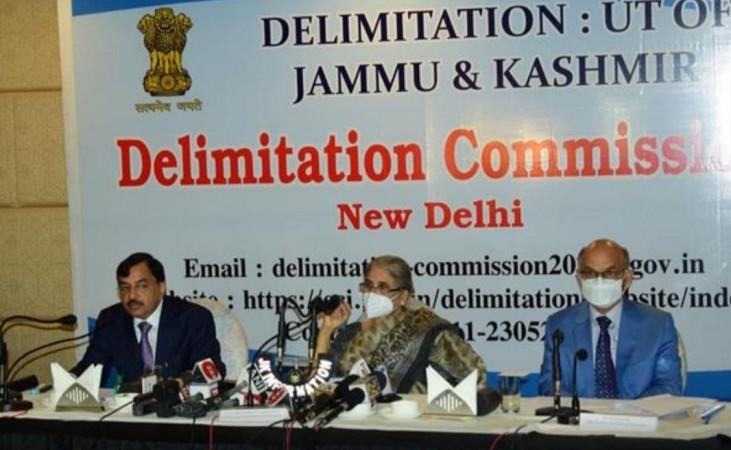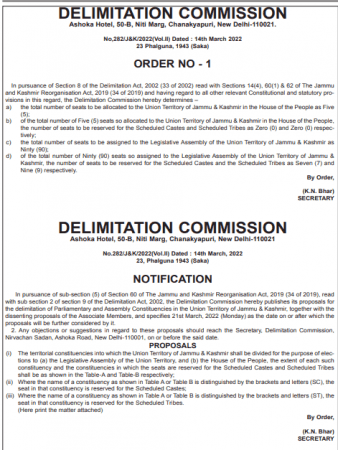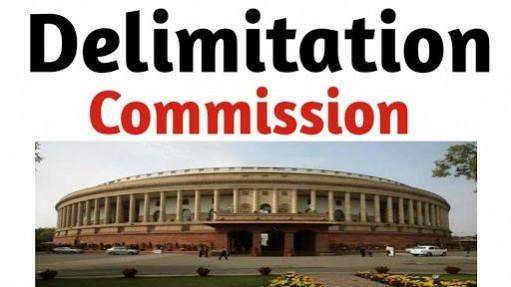After incorporating some of the suggestions of the associate members, the Delimitation Commission for Jammu and Kashmir has put its report in the public domain and invited objections from the general masses till March 21, 2020.
According to a statement issued by the Secretary of the Commission K N Bhar, the number of Lok Sabha seats in Jammu and Kashmir will remain five and no Parliamentary seat has been reserved with Scheduled Castes and Scheduled Tribes.
"The total number of seats to be assigned to the Legislative Assembly of the Union Territory of Jammu & Kashmir is 90. Of the total number of 90 seats so assigned to the Legislative Assembly of the Union Territory of Jammu & Kashmir, the number of seats to be reserved for the Scheduled Castes and the Scheduled Tribes as 7 and 9 respectively", the statement reads.

The statement said the Commission has published its proposals in the Gazette of India, Extraordinary and in the Union Territory of Jammu and Kashmir for the delimitation of Parliamentary and Assembly constituencies in the UT of Jammu and Kashmir for the purpose of elections to House of People (Lok Sabha) and Legislative Assembly.
"Copies of the Gazette are available for reference with the Chief Electoral Officer, UT of Jammu and Kashmir, and the Election officials in all districts of the Union Territory. Objections and suggestions to the people can be given to the Secretary, Delimitation Commission, Ashoka Hotel, 50-B, Niti Marg, Chankyapuri, New Delhi on or before 5 pm on March 21," the statement said.

Commission to visit J&K on March 28, 29
After getting suggestions and objections from the public, the Commission will visit Jammu and Kashmir on March 28 and 29 to meet various deputations before finalizing its report.
Earlier members of the Delimitation Commission had visited Jammu and Kashmir in October 2021, the panel received as many as 290 memorandums during a four-day visit to the Union Territory.
The Commission had received at least 290 representations from political parties and stakeholders. The Delimitation Commission had forwarded all 290 representations to the State Election Commission (SEC) which, in turn, had referred them to 20 Deputy Commissioners of Jammu and Kashmir, who also happen to be the District Electoral Officers (DEOs). All Deputy Commissioners had replied to the suggestions/queries mentioned in the memorandums.

Dissent notes of NC, BJP members also made public
The panel has also made public the objections filed by National Conference and BJP Lok Sabha members before the Commission headed by Justice (Retired) Ranjana Prakash Desai and comprised Chief Election Commissioner (CEC) Sushil Chandra and State Election Commissioner (SEC) KK Sharma.
One dissent note is signed by all three National Conference Lok Sabha members Dr. Farooq Abdullah, Mohammad Akbar Lone, and Hasnain Masoodi. Another note was submitted by Jugal Kishore Sharma, BJP MP.
All of them are Associate Members of the Commission. Union Minister of State in the Prime Minister's Office (PMO) Dr. Jitendra Singh is the fifth associate member.
Before putting the report in the public domain, only the associate members were entitled to file objections. After the report has been put in the public domain, anyone can file the objections which have to be either accepted or rejected by the Commission before submission of the final report.

Commission was constituted in March 2020
Headed by former Supreme Court judge Ranjana Prakash Desai, the Delimitation Commission for Jammu and Kashmir was constituted by the Centre on March 6, 2020, to redraw Lok Sabha and assembly constituencies of the Union Territory.
The panel was constituted in accordance with the provisions of the Jammu and Kashmir Reorganisation Act, 2019, which bifurcated the erstwhile state into union territories of J&K and Ladakh.
The Commission has Chief Election Commissioner Sushil Chandra and the state election commissioner of Jammu and Kashmir as its ex-officio members. The elections to the Assembly of the Union Territory of Jammu and Kashmir will be held only after the process of delimitation is completed.
In February this year, two months extension was granted to the Panel to finalize its report. The Commission has its term till May 6 and there was a possibility that it might submit its final report within the timeline.

















